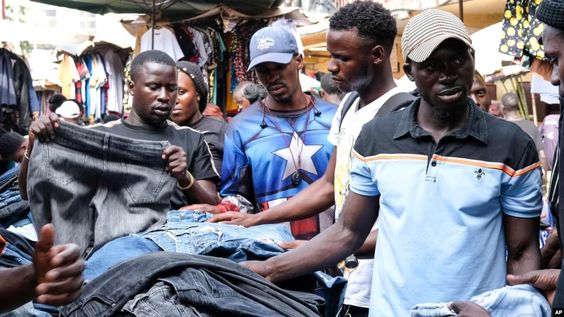Africa
President of Uganda wants to prohibit imports of used clothing from the West

People pack the crowded sidewalks that traverse a sizable outdoor market in the capital of Uganda, jostling for space. Although they are being pushed around in the crowd, they are mainly searching through mounds of used clothing or trying on shoes.
Owino Market in downtown Kampala has long been a sought-after destination for both wealthy and impoverished individuals looking for reasonably priced but well-made secondhand clothing, reinforcing the idea that Western design is superior to that produced locally.
These clothing are frequently purchased from wholesalers and then sold to African nations via middlemen after being discarded by Europeans and Americans. Approximately two-thirds of people in seven countries in East Africa “purchased at least a portion of their clothes from the secondhand clothing market,” according to the most recent survey providing these specifics, conducted by the U.S. Agency for International Development in 2017.
Despite their appeal, secondhand clothing is coming under more and more criticism. Yoweri Museveni, the semi-authoritarian president of Uganda who has been in office since 1986, announced in August that he was outlawing the importation of secondhand garments because it came “from dead people.”
“When a white person dies, they gather their clothes and send them to Africa,” remarked Museveni.
The president’s instruction needs to be supported by a formal instrument, such as an executive order, and trade officials have not yet enforced it.
As the practise amounts to dumping and threatens the development of regional textile businesses, other African governments are also attempting to halt the shipments. Since 2016, the East African Community trade group, which includes Burundi, Congo, Kenya, Rwanda, South Sudan, Tanzania, and Uganda, has advocated for a ban on the importation of used clothing. Due to pressure from Washington, member nations have not implemented it as quickly.
President’s directive causes panic
The president’s directive has caused alarm among Ugandan traders, for whom the imposition of such a restriction would be disastrous. In the 45 million-person nation’s countless big open-air markets, at roadside booths, and even in mall stores where used clothing is sold as brand-new, they peddle used clothing.
READ ALSO: Uganda accused the World Bank of using pressure to pass an anti-gay law
A pair of denim trousers may be purchased for 20 cents, and a cashmere scarf can be purchased for even less as traders make place for new shipments.
Glen Kalungi, a clothing reseller, visited one of Uganda’s Green Shops, a chain that specialises in secondhand clothing, to look for goods his clients might be interested in, like vintage trousers for men and cotton blouses for ladies.
I like to buy on a budget, he admitted. “I usually come to these Green Shops to check out clothes because they have the best prices around town.”
Kalungi prefers to go during sale periods when he can purchase clothing for pennies on the dollar. Then he makes money by selling them.
At its three locations, the chain, whose owners include Europeans, releases new clothing every two weeks. Retail manager Allan Zavuga revealed that some of the products were purchased from suppliers in China and Germany, among other nations.
Zavuga said of their suppliers, “We are not aware of how they collect the items. “But before they are sent to Uganda, [the clothing] go through all the certification, fumigation, and other processes. And we receive all the necessary documentation.
According to him, the Green Shops recycle used clothing in large quantities, making them environmentally benign.
Trade unions oppose the prohibition
An outright ban on used clothing is opposed by the Kampala-based group of traders, or KACITA, who instead advocate a gradual embargo that would give local garment manufacturers time to increase production to meet demand.
Winfred Arinaitwe, a Ugandan clothing manufacturer, acknowledges that the quality of fabric produced locally is frequently subpar. Unsurprisingly, a lot of individuals choose to purchase worn apparel, she noted.
“Because it lasts longer,” she remarked.
Many people in Owino Market, including some who claim they don’t believe the president’s threat was real, find it impossible to imagine a ban on secondhand clothing.
A prohibition, according to Abdulrashid Ssuuna, who tries to convince market patrons to visit his brother’s used clothing store, would make him unable to support himself.
He described the president’s order as “feeling like they want to chase us out of the country.” “We obtain our food from these old clothing. When you claim that we quit this company, you are really stating that we change our clothes. However, we cannot afford to visit there.
